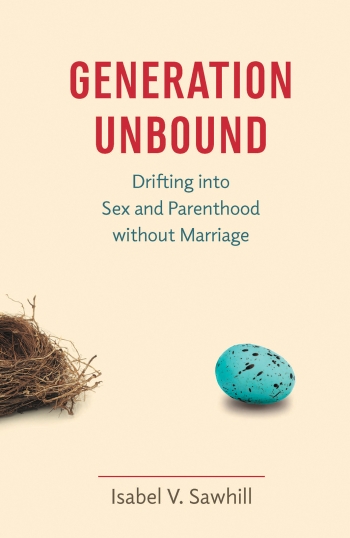Research by Isabel Van Devanter Sawhill ’59, senior fellow in economic studies at the Brookings Institution in Washington, D.C., shows that if individuals finish high school, work full time, and marry before they have children, their chances of falling into poverty drop from 15 percent to 2 percent. Her new book surveys the impact of family structure on children.
Why did you write Generation Unbound?
The main thing that inspired me to write the book was an article I wrote for the Washington Post in 2012, “Twenty Years Later, It Turns Out Dan Quayle Was Right about Murphy Brown and Unmarried Moms,” which was the most-read opinion piece in the Post that calendar year. It was just a reporting of what the research showed, yet the response was so overwhelming that I realized there was great interest in the impact of marriage on children. I think family structure is a very important contributor to what happens to children. Children are the heart of the matter.
I have been working a long time on inequality, social mobility, and poverty. It has become clear that, while raising the minimum wage, offering more subsidized child care, improving the education system, and the Earned Income Tax Credit are important, it is not sufficient to simply improve the programs that help families get ahead. The government can’t do it alone. The Clintons have put it well—governments don’t raise children, families do. I wanted to tackle that side of the issue.
What is the scope of the problem, as you see it?
Most of the babies being born to unmarried women in their 20s are unintended—70 percent of pregnancies are unintended. Pregnancy and childbirth are not something these women want. As a result, they end up in relationships that are not the kind that lead to stable commitments over time. These young women are still searching for the right type of person. Therefore, very frequently they re-partner with another person, having left the other parent, and have additional children. This drives a huge amount of instability and chaos in the early lives of these children. A lot of people think this is a problem for just low-income populations. However, that’s not true—this issue has crept up the socioeconomic ladder. This issue of having children out of marriage has been a dramatic change for this generation—hence the title of the book.
What do you hope readers take away from Generation Unbound?
This book is a summary of serious research, not just my opinions. It is serious research on critical issues—including inconvenient truths about sex and parenthood. The issue of intentional birth is really about the wellbeing of children. It is clear that an early, unplanned birth really affects a child’s success later in life. Also, cohabitation is not a substitution for marriage. Later marriages are much more stable than early ones.
Levin is a senior manager of the Civil Society group and a Global Leadership Fellow at the World Economic Forum in Geneva, Switzerland.








We ask that those who engage in Wellesley magazine's online community act with honesty, integrity, and respect. (Remember the honor code, alums?) We reserve the right to remove comments by impersonators or comments that are not civil and relevant to the subject at hand. By posting here, you are permitting Wellesley magazine to edit and republish your comment in all media. Please remember that all posts are public.